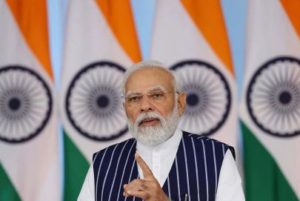
 In this special series around the Uniform Civil Code, we present to you an in-depth dive into the subject. This ten-part series will do a threadbare analysis of various aspects of the UCC-a dream of the founders of the Indian constitution that has remained elusive and a victim to the politics of vote bank and fear-mongering.
In this special series around the Uniform Civil Code, we present to you an in-depth dive into the subject. This ten-part series will do a threadbare analysis of various aspects of the UCC-a dream of the founders of the Indian constitution that has remained elusive and a victim to the politics of vote bank and fear-mongering.
A lot has been said about the Uniform Civil Code ever since the Prime Minister raised the issue while addressing a rally in the poll-bound state of Madhya Pradesh. Uniform Civil Code is part of the Directive Principles of State Policy under Article 44 of the Indian constitution. Article 44 binds the state to make endeavours for the eventual implementation of a Uniform Civil Code in India. But the mere mention of the word sends the world of politics into a tizzy. There is fearmongering, misinformation, and political distortion. Some political parties went to the extent of saying that Hindu law would now be applied to Muslims. Nothing can be farther from the truth.
Diversity and freedom to practise one’s religion are cited as the key grounds against the idea of a Uniform Civil Code. Both these facets of India’s democracy are protected broadly under fundamental rights that make the idea of a UCC tricky to implement but are not the ultimate roadblocks to it.
1. Uniform Civil Code is not about how you pray, eat, or dress: Many politicians will have you believe otherwise. But Uniform Civil Code will not infringe on the right of any community or individuals as to how they pray, eat, or dress. These matters are guarded under the right to privacy by the pronouncement of the Supreme Court under a constitution bench judgement. No law or code can prescribe a dress code for individuals in public life, or what one chooses to eat or the religion any citizen chooses to follow. The Uniform Civil Code is not about any of these facets. The common civil code will not touch upon any of these aspects.
2. Uniform Civil Code will adversely affect cultural diversity is a myth: India is vastly diverse in languages, food, customs, festivals, clothes, and much more. Uniform Civil Code will not affect the celebration or observance of any festivals. It will not adversely affect any food tradition or the vast expanse of cultural diversity in India. Languages, food, clothes, local festivals, and customary celebrations are not regulated in any manner or form by the Uniform Civil Code. Cultural diversity is an aspect of religious diversity in India. But divergent cultural practices are seen in the same religion, for example, Hindu practices and customs in Gujarat are polar opposite to Bengali beliefs and customs. Diversity has survived in the Hindu religion despite rationalisation of personal laws and their codification.
3. There is no Hindu law that can be imposed on any community: There is no law of Manusmriti, Mitakshara, or Dayabhaga that can be imposed on any community or individual. The Hindu Personal Law has been the subject of various reforms and amendments. Even the inheritance laws for Hindus have been overhauled to give women a fair share in ancestral property. No facets of the Hindu Code Bill can be applied to Muslims or any other community. The Indian constitution guards against any such imposition. The Hindu Marriage Act is applicable only to Hindus, Buddhists, Sikhs, and Jains. It cannot be extended to any other community. Any individual or group preaching that the Uniform Civil Code shall implement the law of the majority on the minority communities is spreading misinformation and falsehoods.
4. A Nikah, Saat Phere, or a Church wedding will not be dislodged by the Uniform Civil Code: In Western democracies, where there are no personal laws, a common civil code governs all citizens. Customary practices or religious methods of conducting a wedding have not ceased to exist. These methods just do not have a legal sanction. So while you can have a Nikah ceremony in London, you would mandatorily have to register your marriage for it to be legally recognised. The presence of a civil code is not the antithesis of religious ceremonies or customs. Despite the civil code, you can have the ceremony but the law will prescribe a method under which it shall be legally recognised. The religious practice is not forbidden or barred. It just doesn’t enjoy the legal sanction without the process of registration, in cases of marriage especially.
5. A ‘secular’ country cannot have a civil code: Most secular democracies have a common civil code that governs their country. No democratic country across the world has a parallel verse of personal laws as it exists in India. A Muslim or a Hindu continue to be true adherents of their religion while they live in any other part of the democratic world. Sharia is not legally protected or enforced in any part of the democratic world. Any kind of attempt to create a parallel legal system is rightly frowned upon in modern democracies. All modern democracies are ‘secular’ in nature.




 Driving Naari Programme launched in Chandigarh
Driving Naari Programme launched in Chandigarh






























